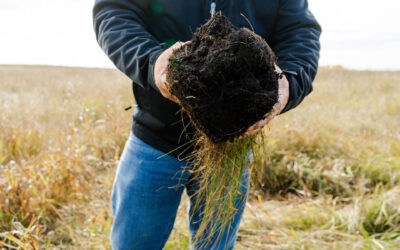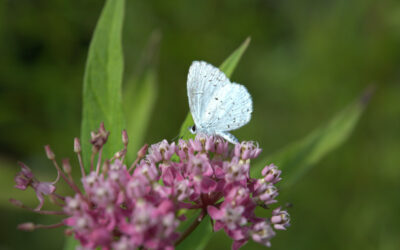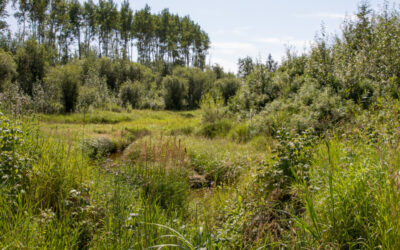An Urban Meadow
ALUS Canada is best known for its work on farms and ranches in 21 agricultural communities across Canada, but it also supports an interesting urban project, the Indigenous Plant Species Biome garden at the Southern Alberta Institute of Technology (SAIT) in Calgary.
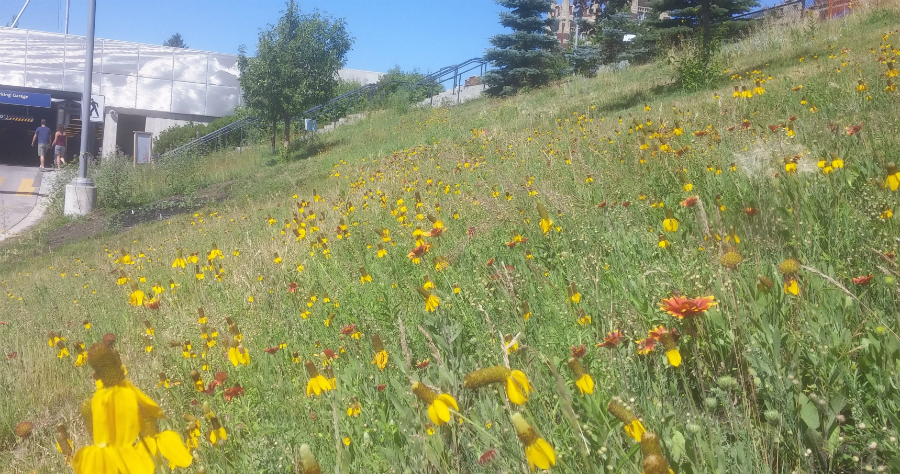
ALUS Canada is best known for its work on farms and ranches in 21 agricultural communities across Canada, but it also supports an interesting urban project, the Indigenous Plant Species Biome garden at the Southern Alberta Institute of Technology (SAIT) in Calgary.
And on August 29, 2017, when ALUS Canada announced important new funding by Alberta philanthropist David Bissett (see story here), nearly 50 guests joined ALUS and SAIT to unveil new ALUS signs for this native plant garden on the grounds of this busy urban campus.
Created in honour of the SAIT’s centennial anniversary in 2016, the garden comprises 1,000 m2 (nearly 11,000 sq.ft.) that has been transformed from a parched lawn into a beautifully diverse meadow of drought-tolerant, pollinator-friendly plant species, all native to Alberta’s foothills biome.
“The biome garden is looking great this year,” reports Howie Bjorge, ALUS Canada’s Agrologist, who advised SAIT on plant selection and coordinated the donation of plant material to the biome project. “We’ve had three consecutive summers of drought in southern Alberta, and it has survived admirably well. It goes to show how well suited our native plants are to local conditions.”
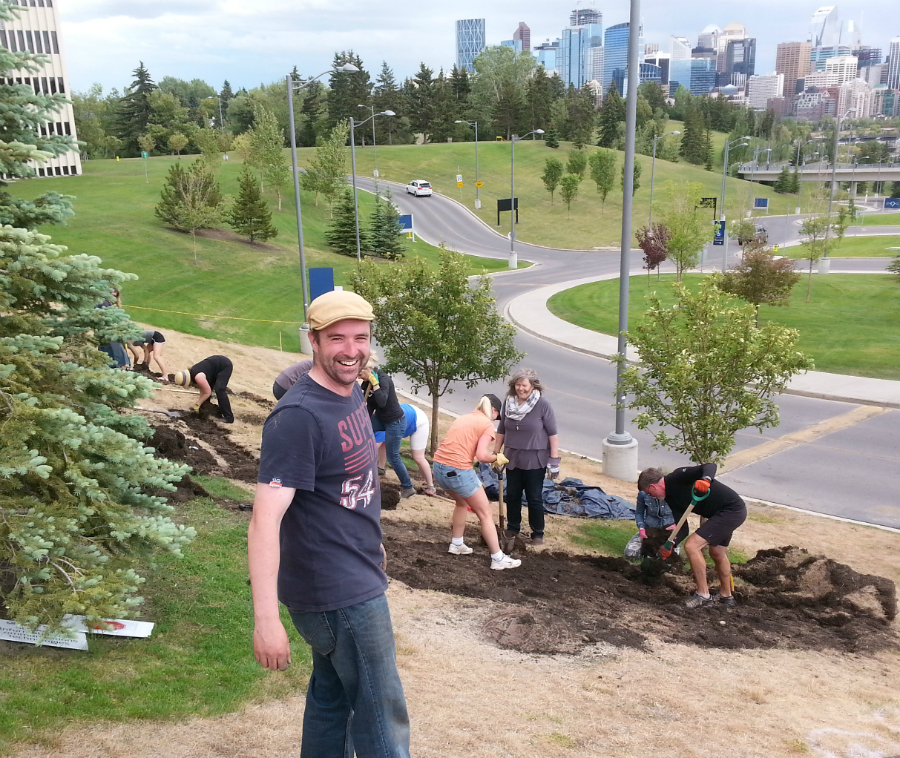
Enda Morley and volunteers planting the Biome project at SAIT in 2016. Created in honour of the SAIT’s centennial anniversary in 2016, the garden comprises 1,000 m2 (nearly 11,000 sq.ft.) that has been transformed from a parched lawn into a beautifully diverse meadow of drought-tolerant, pollinator-friendly plant species, all native to Alberta’s foothills biome.
Why is ALUS supporting this initiative? “The SAIT biome garden is important as a vivid demonstration to SAIT students, who are the future technical experts of Alberta’s agriculture sector, that even small pieces of marginal land can be useful for producing valuable ecosystem services,” said Christine Campbell, ALUS Canada’ Western Hub Manager.
The man behind this initiative is Enda Morley, the Academic Chair for SAIT’s Academic Upgrading Program, who also serves as the coordinator for the SAIT Indigenous Plant Species Biome.
ALUS Canada helped Morley select plant species important for the production of ecosystem services, with particular significance to Alberta farmers and ranchers. ALUS Canada also contributed 12 Alberta wild rose (Rosa acicularis) plants, the provincial emblem, as well as 50 plugs of Sweetgrass (Hierochloe odorata), to the biome project.
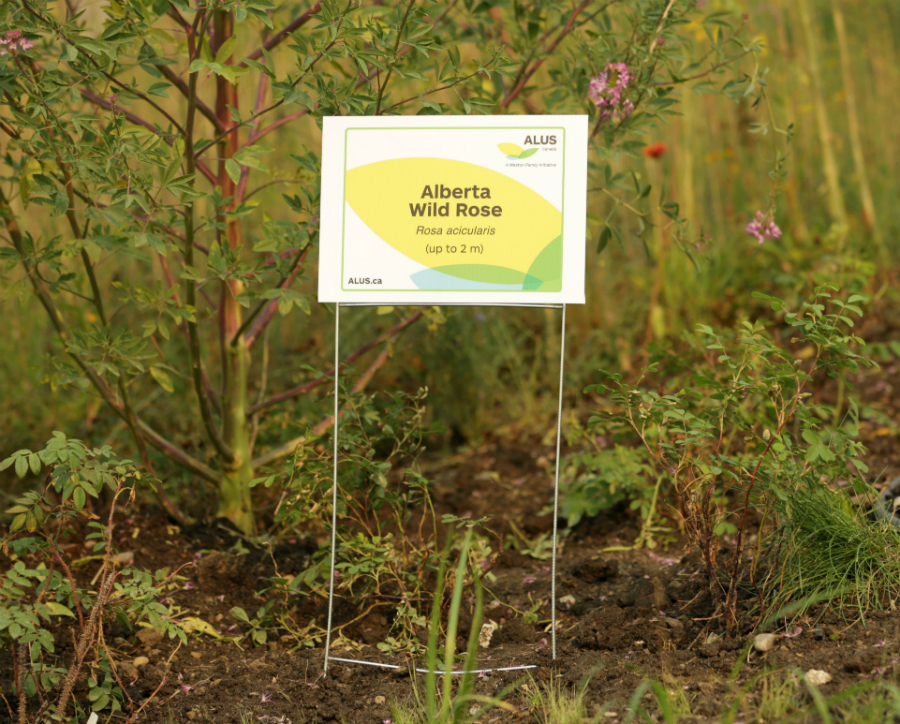
While planning the Indigenous Plant Species Biome garden, ALUS helped SAIT select plant species of importance in the production of ecosystem services with particular significance to Alberta farmers and ranchers. ALUS also contributed 12 plants of Alberta wild rose (Rosa acicularis), the provincial emblem, and 50 plugs of Sweetgrass (Hierochloe odorata) to the biome project.
According to Morley, the garden originated as a multipurpose project: “I saw an opportunity to create a resource for our students and to support applied learning in a natural setting,” he said. “We wanted to highlight plants that are culturally significant for our First Nations communities, while benefitting the bee hives kept by SAIT’s culinary school.”
“I also hoped that the larger community would benefit from it, as a natural space they could admire and appreciate within a city,” he said.
Indeed, the SAIT biome has become an urban meadow, that brightens the day of SAIT students and staff, and reminds passers-by that all Canada’s cities are built on just such a natural landscape.
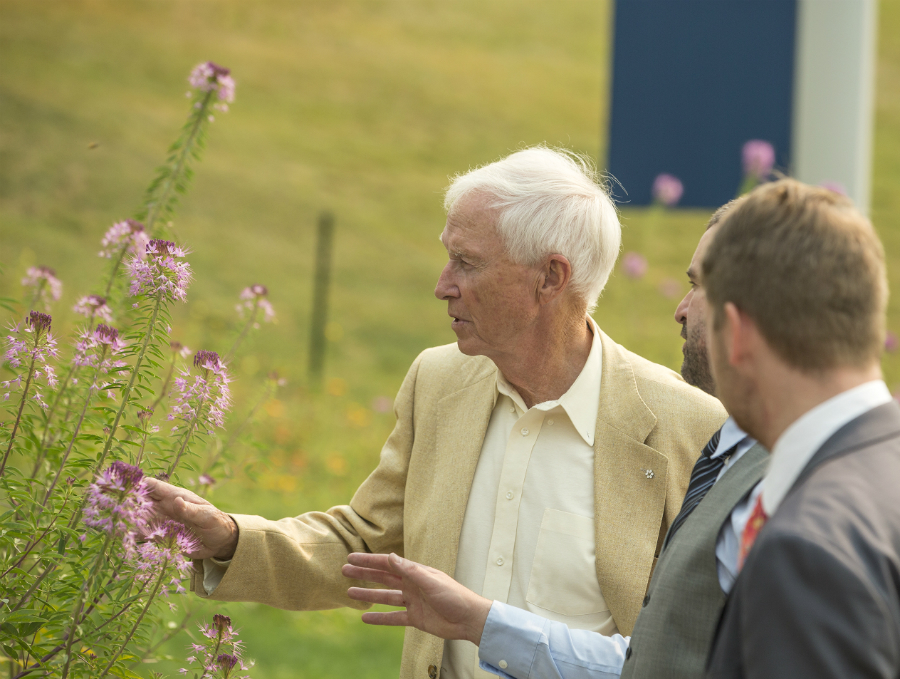
Enda Morley (centre) tells ALUS Canada supporter David Bissett (left) and Calgary-Hawkwood MLA Michael Connolly (right) about some the native plants established in the SAIT biome garden, such as this Rocky Mountain Bee plant (Cleome serrulata). On August 29, 2017, nearly 50 guests joined ALUS on the grounds of the Southern Alberta Institute of Technology in Calgary (SAIT) to unveil new signage for the native plants ALUS Canada had donated to the SAIT Indigenous Plant Species Biome garden.
ACKNOWLEDGEMENTS
According to coordinator Enda Morley, the SAIT Indigenous Plant Species Biome garden was a labour of love involving many volunteers and collaborators in addition to many people at SAIT and ALUS Canada, including Steven and Eileen Tannas (ESRS), Linda Foulis (Beautiful Blooms), The City of Calgary Parks Department, Paul Hoekstra (Syngenta’s Operation Pollinator), Fred deMille, The Blackfoot Elders and SAIT’s Chinook Lodge. A special thanks to Howie Bjorge, ALUS Canada’s Agrologist, for advising on plant selection and coordinating the donation of plant material to the biome garden.

